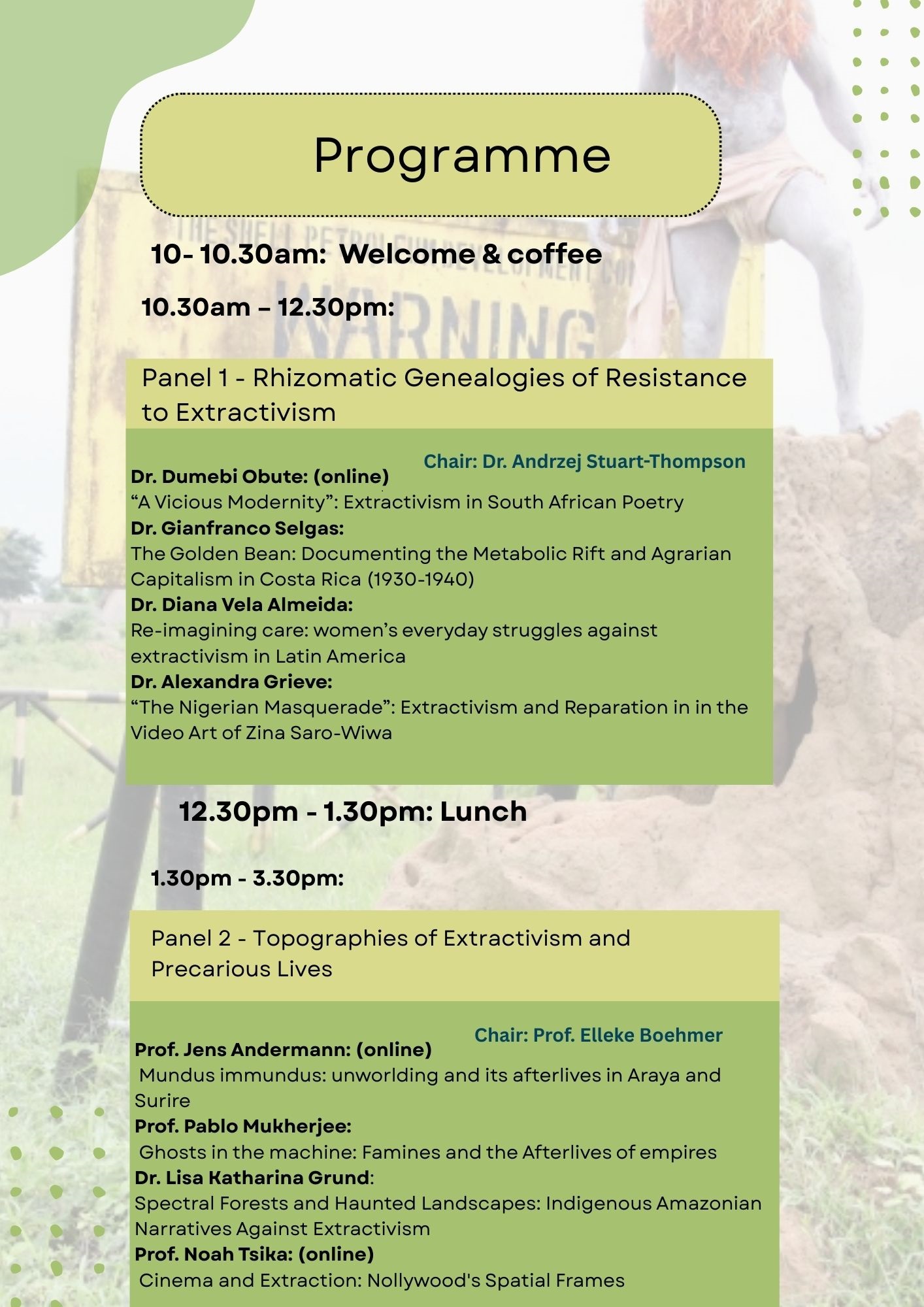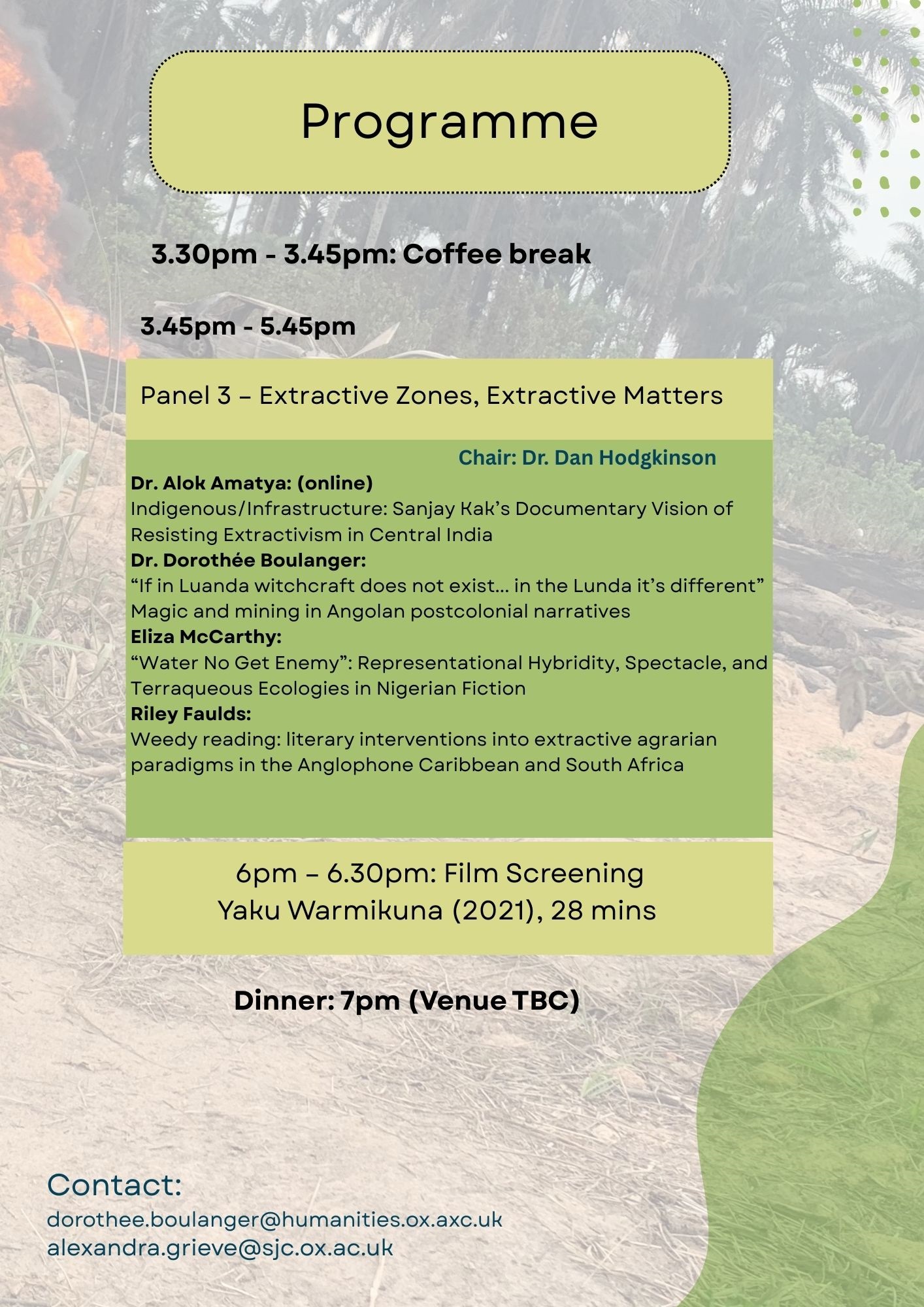Extractivism Viewed from the South: Comparative Perspectives in Film and Literature
African Languages, Literatures and Cultures Network

Extractivism Viewed from the South: Comparative Perspectives in Film and Literature
One Day Workshop
Part of the African Languages, Literatures and Cultures Network events
Thursday 19 June 2025, All Day
Online and in person, Colin Matthew Room, Radcliffe Humanities Building
In-person registration is now SOLD OUT
Register here for in-person attendance.
Register here for online attendance.
Online registration closes 15 minutes before the start of the event. You will be sent the joining link within 24 hours of the event, on the day and once again 10 minutes before the event starts.


This workshop proposes to examine the ways in which extractivism, which can be defined as a mode of extraction of resources and energy that is inherently exploitative, ecologically unsustainable and supports imperial modes of living (Post 2023: 12), is represented in film, poetry, orality and literary fiction from the Global South. By exploring perspectives on extractivism from Angola, Brazil, the Caribbean, Chile, Costa Rica, Ecuador, India, Nigeria and South Africa, we seek to highlight the connections between coloniality and environmental destruction, human and more-than-human exploitation, while grounding our reflection in the material realities of the Global South in their historical, cultural, ecological and linguistic diversity. In line with Malcom Ferdinand’s decolonial ecology (2021), which explicitly connects social justice and environmental struggles, we analyse poetry, fiction, film and visual media in Aikanã, English, French, Portuguese and Spanish through an ecological lens.
Examining literary and visual representations of extractivism– also understood as a process that reduces more-than-human (and, historically, some human) forms of life to global commodities (Gómez-Barris 2017: xvi) – and multifaceted resistance against it, this workshop’s papers will shed light on extractivism’s regional, ecological and cultural specificities across the globe, offering opportunities for researchers to dialogue across disciplines, areas and languages. A comparative perspective also highlights and questions the usefulness of the Global South as concept and reality from different regional perspectives, and in connection with issues surrounding extractivism and its visual and literary representations.
Environmental crises have regularly been labelled a crisis of the imagination, an inability of seeing and imagining worlds beyond capitalism and neoliberalism. Similarly to the term “Anthropocene”, which blames the human species, rather than a small minority of men, for ecocide, the idea of “a crisis of the imagination” may need to be revised, as we consider the cultural production of peoples who have long struggled against cultural and epistemic erasure. With this in mind, the question of the capacity of literature and film from the Global South to adequately report and mobilise about environmental issues as political issues, can be a productive way to engage with creative representations of extractivism. Beyond representations and denunciations of extractivism, we wish to explore artistic and literary works portraying the multifaceted ways in which humans and more-than-humans have sustained alternative modes of inhabiting the earth, resisted extractive forces, imagined new forms of interspecies solidarities, and deployed unforeseen forms of agency.
Programme:
10am - 10.30am: Welcome & coffee
10.30am - 12.30pm: Panel 1 - Rhizomatic Genealogies of Resistance to Extractivism
Chair: Dr. Andrzej Stuart-Thompson
Dr. Dumebi Obute:
“A Vicious Modernity”: Extractivism in South African Poetry
Dr. Gianfranco Selgas:
The Golden Bean: Documenting the Metabolic Rift and Agrarian Capitalism in Costa Rica (1930-1940)
Dr. Diana Vela Almeida:
Re-imagining care: women’s everyday struggles against extractivism in Latin America
Dr. Alexandra Grieve:
“The Nigerian Masquerade”: Extractivism and Reparation in in the Video Art of Zina Saro-Wiwa
12.30pm - 1.30pm: Lunch
1.30pm - 3.30pm: Panel 2 - Topographies of Extractivism and Precarious Lives
Chair: Prof. Elleke Boehmer
Prof. Jens Andermann:
Mundus immundus: unworlding and its afterlives in Araya and Surire
Prof. Pablo Mukherjee:
Ghosts in the machine: Famines and the Afterlives of empires
Dr. Lisa Katharina Grund:
Spectral Forests and Haunted Landscapes: Indigenous Amazonian Narratives Against Extractivism
Prof. Noah Tsika:
Cinema and Extraction: Nollywood's Spatial Frames
3.30pm - 3.45pm: Coffee break
3.45pm - 5.45pm Panel 3 – Extractive Zones, Extractive Matters
Chair: Dr. Dan Hodgkinson
Dr. Alok Amatya:
Indigenous/Infrastructure: Sanjay Kak’s Documentary Vision of Resisting Extractivism in Central India
Dr. Dorothée Boulanger:
“If in Luanda witchcraft does not exist... in the Lunda it’s different” Magic and mining in Angolan postcolonial narratives
Eliza McCarthy:
“Water No Get Enemy”: Representational Hybridity, Spectacle, and Terraqueous Ecologies in Nigerian Fiction
Riley Faulds:
Weedy reading: literary interventions into extractive agrarian paradigms in the Anglophone Caribbean and South Africa
6pm – 6.30pm: Film Screening
Yaku Warmikuna (2021), 28 mins
Dinner: 7pm (Venue TBC)
Contact:
dorothee.boulanger@humanities.ox.axc.uk
Intersectional Humanities, African Languages, Literatures and Cultures Network, AfOx - TORCH Visiting Fellowships


